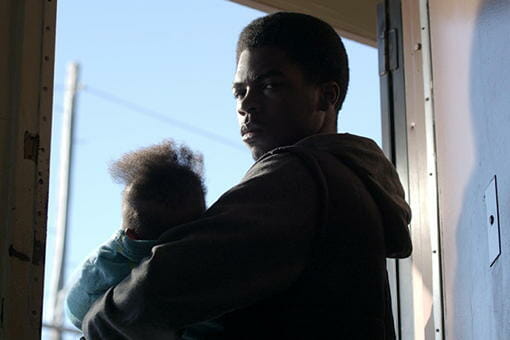By Meredith Alloway · March 30, 2013

One of the best parts of film festivals is the opportunity for new, ripe talent to shine. Of the many directorial debuts, one in particular caught the eye of audiences. Licks broke the mold of typical “gang drama” films.”
Writer/director Jonathan Singer-Vine’s feature explores a young man, D, who’s just been released from two years in prison after a robbery. When he returns to his home in Oakland, he must fight not to get sucked back into the quicksand of crime that fosters his community.
During SXSW, I spoke with Vine about hip-hop, prison, and how his writing makes him sometimes feel schizophrenic.
ATW: You’re only 25, and you have a huge portfolio of music videos! How did that all begin for you?
V: I have an identical twin brother, and in high school he started a production duo called The Cataracs. He introduced me to a lot of good people and artists. I always loved movies, and from a young age they had a big impact on me. I knew I wanted to do something with film. I did music videos for just a year. I was able to get up to mid-size budgets, and through that I really got some good hands on, set experience working with a crew and also a lot of experience indie filmmaking, doing it all in house on final cut on a laptop. I was able to work with the same DP who shot Licks!
ATW: Licks isn’t your typical gangster film, and that’s what people love about it. Where did the story start?
V: Yea. I would never do a movie one way. I like hybrid genre blending, and I don’t like movies you know everything from the trailer. Growing up in Berkeley, it is really a diverse city. It was a city where we all, starting in elementary school, were able to friend kids of all backgrounds. I’ve always been interested in the African-American community for many reasons. Hip hop influenced me and my brother so much, it’s even in the way I speak, some people think I’m from the South!
ATW: So it started with that culture?
V: For sure. But I had all these characters that I came across or that I created in my head from a story.
ATW: How did you create D? He’s a quiet, but very intricate character.
V: D represents so many people. There’s all these movies that take place in the hood with these strong dudes who have tattoos on their face, ya know? You’d be surprised how many people you walk by in Oakland that just look normal who’ve been to prison. There are also some people who enjoy prison in a weird way, and I’ve seen it. I talked to one guy who’d done 36 years in prison and others who’d done less than a year. They all told me you don’t know till you’ve done it.
ATW: How did you find these guys to talk to?
V: Through friends and also my associate producers. We’re letting slavery happen, researching the industrial prison complex. It’s really cheap labor, and it’s definitely messed up. I would talk to these guys, and being a felon no one wants to help you. There are so many young felons coming out, and it’s tough.
ATW: There’s a quote in the film, ‘Tragedies are a part of life and will make you stronger.’ Is this an important line for D to hear?
V: It’s really important because the hood is a tragic place, and a lot of people give up and fall victim to it. Some people’s reactions were Is it really that bad? Watching my movie, I thought it was PG compared to what’s going on! You gotta stay as positive as possible. It’s a cycle out there. The characters in Licks are real people, and if you’re shocked by their actions, I hope people will understand how they got that way. Why does someone sell drugs or their only way to make money is to rob people?
ATW: What’s your writing nest or routine?
V: First of all you have to mentally prepare yourself that it’s not fun. For me, I would wake up early in the morning. My best time is the hour after I wake up and the hour before I fall asleep. I love taking three hours of walking around outside every day. You just look like a crazy person because you’re acting out all your scenes while you’re walking! You become your characters, and it’s the most emotionally draining experience writing a good script. As a writer you become a schizophrenic person just talking to yourself!
ATW: After you finished the script, did you feel you really had to then focus on directing, especially since the majority of your actors didn’t have any experience?
V: You really know if your script makes the cut in rehearsal. We had three months of rehearsal. Each actor came in twice a week, but A-listers aren’t going to do that. I don’t know if I want to work with people who won’t rehearse. Then you start changing your script around all over again; you have 20 more drafts. Justin (Hongry) Robinson came on after the first several drafts as a co-writer. I couldn’t have written the final draft without him!